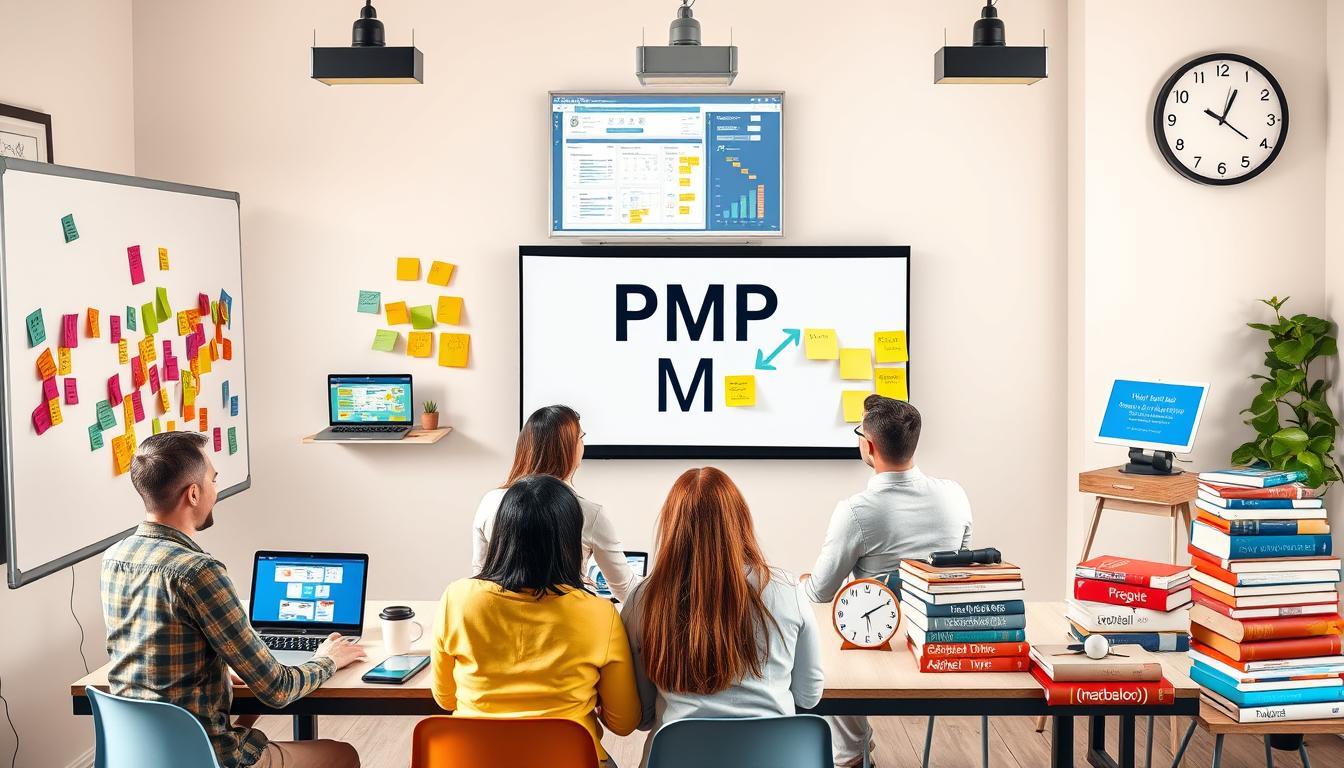As a project management professional looking to take your career to the next level, obtaining the Project Management Professional (PMP®) certification is an important step in achieving your goals. However, one of the requirements for PMP® certification eligibility is to have completed 35 contact hours of project management education. In this comprehensive guide, we will take a deep dive into the different ways you can obtain those 35 contact hours and make sure you are prepared to take on the PMP® exam.
Understanding the Importance of Professional Development in Project Management
Before we delve into the practicalities of obtaining the 35 contact hours necessary for PMP® certification eligibility, it’s important to understand why professional development is crucial for project management professionals. As project management is an ever-evolving field, keeping up-to-date with the latest tools, techniques and trends is imperative to ensure you remain an effective professional. Additionally, professional development in project management shows commitment to the field and a desire to continuously improve.
The Benefits of Earning Professional Development Units (PDUs)
Professional Development Units (PDUs) are a way of measuring the learning and education you’ve completed in the project management field. They are awarded by the Project Management Institute (PMI), the organization responsible for certifying PMP® professionals. PDUs can be earned in a variety of ways, including courses, conferences, volunteering, and self-directed learning. Earning PDUs is not only a way of satisfying the 35 contact-hour requirement for PMP® certification eligibility, but it’s also a way of demonstrating to employers and clients that you are committed to professional development.
How to Choose the Right Professional Development Courses for You
With so many different professional development courses available, it can be challenging to determine which ones are right for you. When looking for courses to complete your 35 contact hours, consider the following factors:
- The course’s relevance to your current or desired field of work.
- The quality of the course provider and instructor.
- The modality of the course, e.g., on-site, online, or hybrid.
- The cost and duration of the course.
- The number of PDUs offered by the course.
When evaluating courses, keep in mind that not all courses that offer PDUs are approved by PMI. To ensure that the course you take counts towards your PMP® certification eligibility, make sure it’s a PMI-approved course.
Another important factor to consider when choosing professional development courses is the level of difficulty. It’s essential to choose courses that challenge you and help you grow as a project management professional. However, it’s also crucial to ensure that the courses are not too advanced, as this can lead to frustration and a lack of motivation.
Furthermore, it’s essential to choose courses that align with your career goals. If you’re looking to specialize in a particular area of project management, such as risk management or agile methodologies, it’s crucial to choose courses that focus on these areas. This will help you gain the knowledge and skills necessary to excel in your chosen field.
Convenient Ways to Earn 35 Hours of Project Management Education
Online Courses That Will Help You Meet the 35-Hour Requirement
One of the most convenient ways to earn your 35 contact hours is to take an online course. Online courses offer the flexibility to complete the course on your own schedule and from the comfort of your own home or office. PMI offers a variety of online courses that provide PDUs and are approved for PMP® certification eligibility. Additionally, there are many other online course providers that offer project management courses approved by PMI.
How to Earn PDUs While Working Full-Time
As a project management professional, your time is valuable, and you may not have the flexibility to complete a course during regular business hours. The good news is that there are many ways to earn PDUs while working full-time. Here are a few examples:
- Attend project management webinars during lunch breaks.
- Volunteer to organize events or lead initiatives within your organization.
- Listen to project management podcasts during your commute.
- Join a local PMI chapter to attend meetings and network with other professionals.
By finding creative ways to earn PDUs while working full-time, you can meet the 35 contact hour requirement while continuing to excel in your career.
Benefits of Earning 35 Hours of Project Management Education
Earning 35 hours of project management education can provide numerous benefits to your career. Firstly, it can help you stand out in a competitive job market and increase your chances of getting hired. Secondly, it can help you improve your project management skills and knowledge, which can lead to better job performance and increased job satisfaction. Thirdly, it can help you meet the eligibility requirements for the PMP® certification, which is a globally recognized certification for project management professionals.
How to Choose the Right Project Management Course
Choosing the right project management course is crucial to ensure that you get the most out of your 35 hours of education. When selecting a course, consider factors such as the course content, the instructor’s qualifications and experience, the course format (online or in-person), and the cost. Additionally, make sure that the course is approved by PMI and provides PDUs that count towards the 35-hour requirement. By doing your research and selecting the right course, you can ensure that you get the most value out of your project management education.
Keeping Track of Your Project Management Training and Certifications
The Importance of Maintaining Accurate Records of Your PM Education
As a project management professional committed to professional development, keeping accurate records of your PM education and certifications is essential. Accurate records can help you keep track of the PDUs you’ve earned and the certifications you’ve obtained. Additionally, maintaining accurate records can help you prepare for audits, should they arise. PMI requires PMP® professionals to maintain records of their PDUs and renew their certification every three years.
Tools and Apps to Help You Keep Track of Your PM Training
Fortunately, there are many tools and apps available to help you keep track of your PM education and certifications. Many of these tools integrate with PMI’s website and can automatically update your records when you complete a course or earn a certification. Some tools even offer reminders and notifications to help you stay on track with your professional development goals.
One such tool is the PMI Talent Triangle® Tracker, which is available to PMI members. This tool allows you to track your professional development in the three areas of the PMI Talent Triangle®: technical project management, leadership, and strategic and business management. By tracking your development in these areas, you can ensure that you are well-rounded and prepared for any project management challenges that come your way.
Top Products to Help You Prepare for the PMP® Exam
PMP® Exam Prep Books That Will Help You Pass on the First Try
The PMP® exam is notoriously difficult, and it’s essential to be fully prepared before sitting for the exam. While completing the 35 contact hours of education is necessary for PMP® certification eligibility, it may not be enough to prepare you for the exam. There are many PMP® exam prep books available that can help you familiarize yourself with the exam content and format. Look for books that cover the PMBOK® Guide in-depth and offer practice questions and exams.
Online PMP® Exam Prep Courses That Are Worth the Investment
If you prefer a more structured approach to exam prep, an online PMP® exam prep course may be a better option for you. There are many online course providers that offer comprehensive PMP® exam prep courses that cover the PMBOK® Guide in-depth, offer practice questions and exams, and provide instructors that can answer your questions. When evaluating online prep courses, look for those that offer a high pass rate and come highly recommended by previous students.
Study Groups and Peer Support for PMP® Exam Prep
Another effective way to prepare for the PMP® exam is to join a study group or seek peer support. This can be especially helpful for those who prefer a collaborative learning environment. You can find study groups through professional organizations, online forums, or even by reaching out to colleagues who are also preparing for the exam. In addition to sharing study materials and tips, study groups can provide motivation and accountability to keep you on track with your exam prep.
Additional Resources for Project Management Professionals
Project Management Blogs and Websites You Should Follow
There are many excellent resources on the internet for project management professionals. Blogs and websites provide information on the latest trends, tools, and techniques in project management. Some of the best project management blogs and websites include:
- ProjectManagement.com
- PMI.org
- ProjectManager.com
- Project Times
- PMHut
Must-Read Books for Project Managers
Reading books on project management topics can help you deepen your knowledge and improve your skills. Look for books that cover a wide range of project management topics, including leadership, risk management, and stakeholder management. Some must-read books for project managers include:
- Project Management: A Systems Approach to Planning, Scheduling, and Controlling by Harold Kerzner
- Critical Chain: A Business Novel by Eliyahu Goldratt
- Managing Successful Projects with PRINCE2 by Axelos
Networking Opportunities for Project Management Professionals
Networking with other project management professionals can help you grow your career and stay current in the field. Joining a local PMI chapter or attending project management conferences and events can provide opportunities to meet other professionals, share knowledge and best practices, and build lasting relationships.
Obtaining the required 35 contact hours for PMP® certification eligibility is a vital step for any project management professional looking to take their career to the next level. By leveraging multiple sources of education and using tools and resources to keep track of your progress, you can meet this requirement and be well on your way to obtaining your PMP® certification.
Another great way to expand your knowledge and skills in project management is by attending workshops and training sessions. These sessions can provide hands-on experience and practical knowledge that can be applied to your work. Look for workshops and training sessions that cover topics such as agile project management, project risk management, and project scheduling.
It’s also important to stay up-to-date with the latest project management software and tools. Many software companies offer free trials or demos of their products, allowing you to test them out before making a purchase. Some popular project management tools include Asana, Trello, and Microsoft Project.




